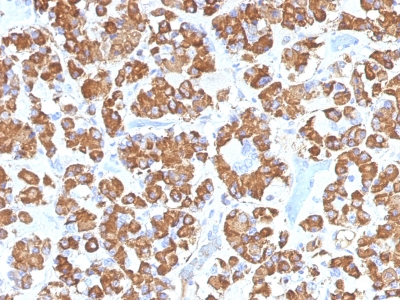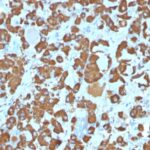Human Anti-Growth Hormone Antibody Product Attributes
Growth Hormone Previously Observed Antibody Staining Patterns
Observed Antibody Staining Data By Tissue Type:
Variations in Growth Hormone antibody staining intensity in immunohistochemistry on tissue sections are present across different anatomical locations. An intense signal was observed in cells in the anterior in pituitary gland and trophoblastic cells in the placenta. More moderate antibody staining intensity was present in cells in the anterior in pituitary gland and trophoblastic cells in the placenta. Low, but measureable presence of Growth Hormone could be seen in. We were unable to detect Growth Hormone in other tissues. Disease states, inflammation, and other physiological changes can have a substantial impact on antibody staining patterns. These measurements were all taken in tissues deemed normal or from patients without known disease.
| Growth Hormone General Information | |
|---|---|
| Alternate Names | |
| GH1, GH, Pituitary Growth Hormone, Growth Hormone, Somatotropin | |
| Molecular Weight | |
| 20kDa | |
| Chromosomal Location | |
| 17q24.2 | |
| Curated Database and Bioinformatic Data | |
| Gene Symbol | GH1 |
| Entrez Gene ID | 2688 |
| Ensemble Gene ID | ENSG00000259384 |
| RefSeq Protein Accession(s) | NP_072054, NP_000506, NP_072053 |
| RefSeq mRNA Accession(s) | NM_022559, NM_000515, NM_022560, NM_022561, NM_022562 |
| RefSeq Genomic Accession(s) | NC_000017, NC_018928, NG_011676 |
| UniProt ID(s) | B1A4G7, P01241, B1A4G6 |
| UniGene ID(s) | B1A4G7, P01241, B1A4G6 |
| HGNC ID(s) | 4261 |
| Cosmic ID(s) | GH1 |
| KEGG Gene ID(s) | hsa:2688 |
| PharmGKB ID(s) | PA171 |
| General Description of Growth Hormone. | |
| Pituitary growth hormone (GH) plays a crucial role in stimulating and controlling the growth, metabolism and differentiation of many mammalian cell types by modulating the synthesis of multiple mRNA species. These effects are mediated by the binding of GH to its membrane-bound receptor, GHR, and involve a phosphorylation cascade that results in the modulation of numerous signaling pathways. GH is synthesized by acidophilic or somatotropic cells of the anterior pituitary gland. Anti-GH is a useful marker in classification of pituitary tumors and the study of pituitary disease (acromegaly). | |



-150x150.jpg)


There are no reviews yet.